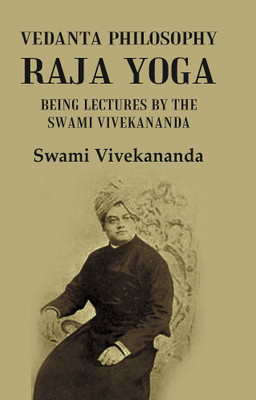Vedanta Philosophy Raja Yoga : Being Lectures By The Swami Vivekananda(Paperback, Swami Vivekananda)
Quick Overview
Product Price Comparison
About The Book : It teaches that desires and wants are in man, that the power of supply is also in man; and that whatever and whenever a desire, a want, a prayer, has been fulfilled, it was out of this infinite magazine that the supply came, and not from any supernatural being. The idea of supernatural beings may rouse to a certain extent the power of action in man, but it also brings spiritual decay. It brings dependence; it brings fear; it brings superstition. It degenerates into a horrible belief in the natural weakness of man. There is no supernatural, says the Yogi, but there are in nature gross manifestations and subtle manifestations. The subtle are the causes, the gross the effects. The gross can be easily perceived by the senses; not so the subtle. The practice of Raja Yoga will lead to the acquisition of the more subtle perceptions. All the orthodox systems of Indian philosophy have one goal in view, the liberation of the soul through perfection. The method is by Yoga. The word Yoga covers an immense ground, but both the Sdnkhya and the Veddntist Schools point to Yoga in some form or other. The subject of the first lectures in the present book is that form of Yoga known as Raja Yoga. The aphorisms of Patanjali are the highest authority and text book on Raja Yoga. Our knowledge is based upon experience. What we call inferential knowledge, in which we go from the less general to the more general, or from the general to the particular, has experience as its basis. In what are called the exact sciences. About The Author : Swami Vivekananda (12 January 1863 ŌĆō 4 July 1902), born Narendranath Datta was an Indian Hindu monk, philosopher, author, religious teacher, and the chief disciple of the Indian mystic Ramakrishna. He was a key figure in the introduction of Vedanta and Yoga to the Western world; and is credited with raising interfaith awareness, and bringing Hinduism to the status of a major world religion. Vivekananda became a popular figure after the 1893 Parliament of Religions in Chicago, where he began his famous speech with the words, "Sisters and brothers of America...," before introducing Hinduism to Americans.He was so impactful at the Parliament that an American newspaper described him as: ŌĆ£an orator by divine right and undoubtedly the greatest figure at the ParliamentŌĆØ. After great success at the Parliament, in the subsequent years, Vivekananda delivered hundreds of lectures across the United States, England and Europe, disseminating the core tenets of Hindu philosophy, and founded the Vedanta Society of New York and the Vedanta Society of San Francisco (now Vedanta Society of Northern California), both of which became the foundations for Vedanta Societies in the West. Vivekananda's success led to a change in mission, namely the establishment of Vedanta centres in the West. Vivekananda adapted traditional Hindu ideas and religiosity to suit the needs and understandings of his western audiences, who were especially attracted by and familiar with western esoteric traditions and movements like Transcendentalism and New thought. An important element in his adaptation of Hindu religiosity was the introduction of his "four yogas" model, which includes Raja yoga, his interpretation of Patanjali's Yoga sutras, which offered a practical means to realise the divine force within which is central to modern western esotericism.In 1896, his book Raja Yoga was published, becoming an instant success; it was highly influential in the western understanding of yoga, in Elizabeth de Michelis's view marking the beginning of modern yoga.


